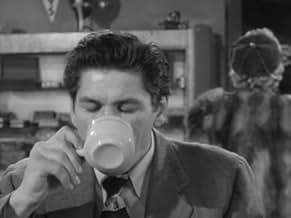Dishonest Frank and Lorna Bramwell visit the home of wealthy, eccentric Monica Laughton, with the intention of robbing her.Dishonest Frank and Lorna Bramwell visit the home of wealthy, eccentric Monica Laughton, with the intention of robbing her.Dishonest Frank and Lorna Bramwell visit the home of wealthy, eccentric Monica Laughton, with the intention of robbing her.
- Director
- Writers
- Stars
- Director
- Writers
- All cast & crew
- Production, box office & more at IMDbPro
Featured reviews
The milkman is her only regular contact. Frank Bramwell (Charles Bronson) overhears a story that Miss Laughton has hidden wealth somewhere in her mansion.
A ne'er do well like Bramwell views Miss Laughton as easy pickings. He goes to see her along with his wife Lorna with a plan to rob her. Only to find just how strange her household set up is.
Miss Laughton is quite mad with a house full of imaginary relatives and always carrying a handbag. She refuses to tell Frank where her money is but plays games with the two would be thieves.
It is not long before the gruesome twosome get their just desserts.
Bronson is a hissable villain. His wife seems a bit dim. Maybe that is why Miss Laughton has them stringing along so quickly.
The story is left rather open ended. Is Miss Laughton in the habit of bumping off people? Her conversation with the milkman seems to point that way.
Winwood's perfect, her bulging eyes and ditzy manner, a perfect foil for the aggressively greedy Bronson. This was still early in the tough guy's career before his acting style was reduced to a single hard-eyed stare. Happily, he shows here that he does have an acting range. Then too Crane makes the rather slow-thinking wife into a reluctant counterpart to hubby Bronson. In my book, the episode is pitch-perfect Hitch fare, the character elements coming together beautifully, with an ironic closing line that fits perfectly, raising also a boggling subtext about how those now invisible family members became invisible. Anyway, hats off to all involved, and to a Bronson that's seldom seen.
"There Was an Old Woman" to me is a great episode with a lot that is truly excellent and with nothing really inherently wrong. Season 1 was a relatively solid season with a few disappointments along the way, and one of its best is "There Was an Old Woman". As far as Stevenson's 'Alfred Hitchcock Presents' entries go, this compares very favourably and one of those that one should see to see whether Stevenson deserved being one of the most used directors on the series (to me he did).
Production values are solid, especially the atmospheric photography. The sets are on the sparse side, but not enough to ruin the episode. As always, the main theme is haunting and certainly fits this tale very well. The episode is suitably ominous audibly. Hitchcock's bookending is typically droll, didn't find that all of them worked in the series but most did work very well and "There Was an Old Woman's" did work very well indeed. The ironic final line is memorable.
Stevenson directs adeptly, he doesn't rush things or lets it slack and he has a good feel for atmosphere. The script is taut and intelligent, with the entertainingly macabre humour standing out. While the story may not have the chill factor of for example "Breakdown", it never felt dull to me or over-stuffed, is very suspenseful and didn't come over as predictable or confusing.
Bronson does scorn, annoyance and nastiness very well indeed and Norma Crane avoids overdoing the whininess. The two work very well together and the characters are suitably jerkish without going overboard. Best of all is the delicious Estelle Winwood, who both amuses and unsettles.
Overall, great. 9/10.
Did you know
- TriviaThe title is the first line of the nursery rhyme about the woman who lived in the shoe.
- GoofsIn the kitchen scene where "Frank" and "Lorna" are eating out of the pan, there are moving shadows on the wall to the left of the screen that are not from the actors.
- Quotes
[first lines]
Alfred Hitchcock: Good evening. I have a request for those of you who are not watching television... Please turn on your set. I'm sure I look much worse in the flamboyant Technicolor of your imagination than I do in the austere black and white of television. Thank you. I'm sure that's much better. Although it may still be one color too many. Black and white are very fitting this evening. As a matter of fact, we considered edging the entire picture in black, but we gave that up. It would have been decidedly unfair to those of you with very small picture tubes, or narrow imaginations. Tonight's fable is about Monday Laughton. A nice little old lady with a penchant for funerals. You shall learn more about Miss Laughton after our sponsor gives this brief but heartfelt eulogy in behalf of his product.
- SoundtracksFuneral March of a Marionette
Written by Charles Gounod
Details
- Runtime
- 30m
- Color
- Aspect ratio
- 1.33 : 1
















